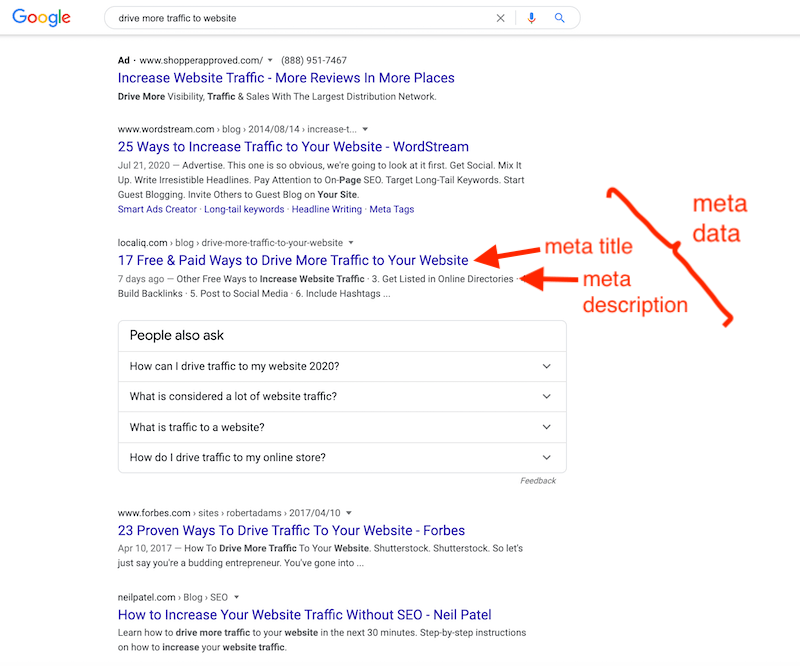The march of time is inevitable. And every year, a new technology drives the nail into the coffin of something older.
Whether the horse and the buggy are replaced by the automobile or the slide rule is replaced by the calculator, everything eventually becomes obsolete.
And if you listen to the rumors, this time it’s search engine optimization. Rest in peace, SEO: 1997-2022.
There is just one very small problem.
SEO is still alive. It is just as relevant today as it ever was. If anything, it may even be more important.
Today, 53% of all website traffic comes from organic search.
In fact, the first search result in Google averages 26.9% clicks on mobile devices and 32% on desktop.
And what helps Google determine which results belong at the top of search engine results pages (SERPs)? SEO, of course.
Need more proof? We have more statistics to back it up.
Thanks to constant updates to Google’s search algorithm, the entire field of SEO is changing rapidly.
Completely ignoring the many small changes to the search engine algorithm, we have seen several major updates over the past decade. Some of the most important are:
Each of these updates has changed the way Google operates, so each has required SEO professionals to rethink their approach and tweak their strategy to ensure they get the results they need. But the need for their services remained.
Now that it’s been established that SEO isn’t dead, it begs the question: where did all this death talk come from in the first place?
Most of them are based on unfounded guesses and wild speculations. The truth is, SEO is in a state of transition, which can be scary.
And this transition is driven by three things:
The Rise Of Machine Learning

You have probably already recognized the impact of AI on the world.
This exciting new technology has started popping up everywhere, from voice assistants to predictive healthcare to self-driving automobiles.
And it’s been a trending topic in SEO for quite a while.
Unfortunately, most of what exists is incomplete information gathered from patent reading, analysis of search engine behavior and guesswork.
And part of the reason it’s so hard to understand what’s going on in search engine AI is because it’s constantly evolving.
However, we will look at two identifiable trends: machine learning and natural language.
Machine learning is exactly what it sounds like: machines that learn.
For a more sophisticated definition, it can be described as “a method of data analysis that automates the construction of analytical models…a branch of artificial intelligence based on the idea that systems can learn from data, identify models and make decisions with minimal human intervention”.
For SEO purposes, this means collecting and analyzing information about content, user behaviors, citations, and patterns, and then using this information to create new ranking factors that are more likely to accurately answer user queries.
You’ll want to read this article for a more in-depth explanation of how this will work.
One of the most important factors used by machine learning to determine how to rank websites is our other trend – natural language.
Since their inception, computers have used unique languages. And because it was very different from the language that humans don’t use, there was always a disconnect between the user’s intent and what the search engines were providing.
However, as technology has become more and more advanced, Google has made great strides in this area.
Most important to SEO professionals is RankBrain, Google’s machine learning system built on the rewrite of Google’s core algorithm we mentioned earlier, Hummingbird.
Almost a decade ago, Google had the foresight to recognize that mobile devices were the future wave. Anticipating what this would mean for research, Hummingbird focused on understanding conversational discourse.
RankBrain builds on this, moving Google away from a search engine that follows links between concepts to see which concepts they represent.
This took the search engine away from matching keywords in a query to more accurately identify the user’s intent and provide results that more closely match the search.
This meant identifying words that were important to search and ignoring those that weren’t.
He has also developed an understanding of synonyms, so if a webpage matches a query, it may show up in the results, even if it doesn’t include the searched keyword.
The biggest impact of RankBrain and machine learning has been on long-tail keywords.
In the past, websites often blocked specific but rarely searched keywords in their content. This allowed them to appear in queries for these topics.
RankBrain changed the way Google handled them, which meant that focusing primarily on long-tail keywords was no longer a good strategy. It also helped weed out content from spammers who were looking for rankings for those terms.
Honey, I Shrunk The Organic Search Space

Search engines are big business, no one can deny that.
And since 2016, Google has been slowly encroaching on organic search results in favor of paid advertising. This is when sponsored ads were removed from the sidebar and placed at the top of the SERPs.
As a result, organic results have been pushed further down the page, or “below the fold,” to borrow an anachronistic idiom.
From Google’s business perspective, this makes sense. The internet has become an important part of the global economy, which means that an ever-increasing number of businesses are willing to pay for ad placement.
Because of this apparent deprioritization, organic SEO professionals are forced to develop new, innovative strategies to not only appear on the first page, but also compete with paid advertisements.
Changes to local search have also affected SERPs. In its never-ending quest to deliver more relevant results to users, Google has added a local pack to search results. This group of three nearby businesses seems to answer the request. They are listed at the top of the first page of results, along with a map showing their location.
This was good news for local businesses competing with national brands. For SEO professionals, however, it has cast a new wrinkle in their work.
In addition to creating competition for local search results, it also opened the door to, you guessed it, local paid search ads.
And those aren’t the only things that push organic results down the page. Depending on the research, your link may also compete with:
Additionally, Google started answering questions directly (and suggested related questions and answers). This has given rise to a phenomenon known as “no-click searches,” which are searches that end up on the SERP without a click to another site.
In 2020, almost 65% of all searches received zero clicks, which is troubling for anyone who makes a living generating them.
With that in mind, and as organic results dwindle further and further, it’s easy to see why some SEO professionals are getting frustrated. But savvy web marketers see them as more than challenges — they see them as opportunities.
For example, if you can’t get your link at the top of a SERP, you can use structured data markup to grab a featured snippet. While not technically an SEO tactic, it is a way to drive clicks and traffic, which is the ultimate goal.
Use Your Voice
Not so long ago, taking a note or making a shopping list meant finding paper and writing on it with a pen. Like a caveman.
Fortunately, those days are over, or at least on the way out, having been replaced by technology.
Whether you’re using Siri to listen to your favorite song, asking Cortana how much the moon weighs, or asking Alexa to check Apple stock prices, much of the internet is now available just by using your voice.
In 2020, 4.2 million personal digital assistants were in use worldwide. And that number is expected to double by 2024 as more people adopt the Amazon Echo, Sonos One, Google Nest Hub, and more.
And users don’t even have their own smart speaker to utilize the power of voice search. 90% of iPhone owners use Siri and 75% of smartphone owners use Google Assistant.
With the advent of these virtual assistants, we have seen a surge in voice search. Here are some interesting facts about voice search:
It depends on who you are. If you work in SEO (and because you’re reading this, we’re going to assume you do), this creates problems.
After all, how do you drive clicks to your website if no clicks are involved?
The answer is pretty obvious: you need to optimize for voice search.
Voice-enabled devices don’t work like a manual search, so your SEO content needs to take that into account.
The best way to do this again is to improve the quality of your information. Your content should be the best answer to someone’s question, ensuring it ranks high and gets the verbal (is that a term?) clicks you need.
And because people have come to realize that more specific queries generate more specific answers, it’s important that your content fills that niche.
In general, specificity seems to be a growing trend in SEO, so it’s no longer enough to just have web copy that says “t-shirts for sale.”
Instead, you should search for exactly what your target is looking for, for example, “garfield t-shirts medium + yellow + long sleeves”.
What Does All This Mean For SEO?

Now that we’ve looked at the top reasons why pessimists and cynics falsely claim SEO is dead, let’s review what we’ve learned along the way:
Have you noticed a theme running through this whole room? It’s evolution, the survival of the fittest.
To make sure you don’t lose important web traffic, you need to constantly monitor the SEO situation and adapt to changes, as you always have.
Your strategy should become more sophisticated as new opportunities arise. It must be ready to pivot quickly.
And above all, you must remember that your content remains the most important thing.
If you can answer a query better, your site will get the traffic you are looking for. If not, you need to rework it until it does.
Remember, like rock and roll, SEO will never die.
Featured image: sitthiphong/Shutterstock
So how much can you earn doing SEO? In September 2021, most SEO experts could earn between $113,518 and $131,590. Salaries depend on many factors, including education, certifications, work experience, and additional skills.
Is SEO a thing anymore?

Make no mistake about it: SEO isn’t dying, but it’s evolving much more than it was years ago. If you’ve been debating whether or not to invest in SEO for your business, read on to find out why SEO isn’t dying — but is actually thriving — in 2021.
Is SEO still relevant in 2022? Will SEO still be relevant in 2022? Yes of course. Although some SEO tactics that were effective in the past have stopped working, SEO has continued to evolve. Constantly reinventing itself to try to better match user intent, removing spammy and ineffective tactics to become better.
Is SEO still relevant in 2021?
So, is SEO still a good investment in 2021, and beyond?! Short answer: YES! SEO is more important than ever! It is still one of the most powerful digital marketing strategies that generate long term results.
Is SEO worth it 2021?
The short answer is that SEO is very effective, not only for driving traffic, but also for generating leads and sales. Do not worry. The long answer includes search and data, not just empty statements. Most SEOs get too caught up in search-specific metrics like SERPs (search engine results page), rankings, and organic traffic.
Will SEO exist in 5 years?
SEO will not be eliminated in the next five years as social media and search engines will more than likely merge. Facebook has already started doing this: they average over 1.5 billion searches per day. Twitter did the same; they joined in partnership with Google.
How has SEO changed in 2021?
4. Desktop Page Experience (UX Driven SEO) and Core Web Vitals. Google has been gradually rolling out the Page Experience Algorithm in 2021. This algorithm update consists of several user experience signals, such as Core Web Vitals, which basically rate the overall experience with the webpage.
Why does SEO Matter 2021?
SEO is important because it allows you to rank for the search terms your target audience searches for. You take up more space in search results, which leads to more website traffic.
Is SEO worth it 2020?
The short answer is that SEO is very effective, not only for driving traffic, but also for generating leads and sales. Do not worry. The long answer includes search and data, not just empty statements. Most SEOs get too caught up in search-specific metrics like SERPs (search engine results page), rankings, and organic traffic.
Why SEO is a waste of money?
– Money spent on SEO is a complete waste. The first page rankings for my business keywords are too competitive. Top results include unbeatable businesses, news agencies, and other websites.
Is it worth paying for SEO?
SEO is worth it if you have the right strategy in place and work with a partner who knows how to get results. Around 93% of online experiences start with a search engine, and the SEO lead-closure rate is far higher than traditional marketing. Thus, SEO offers an impressive return on investment (ROI).
Is SEO worth it in 2022?
Yes, SEO is worth it – in 2022, in the future, in the past and always. As long as websites and search engines exist, SEO is necessary. SEO 10 years from now will likely be very different from SEO today, but you’ll still need to make sure your website is sending search engines the right signals so you can be found.
Is SEO still relevant in 2020?
While some traditional marketing methods may become obsolete, SEO is here to stay in 2020. Whether you invested in SEO early or are just getting started, it can still be a major driver of traffic and leads to your website. .
Does SEO Still Work 2020?
While some traditional marketing methods may become obsolete, SEO is here to stay in 2020. Whether you invested in SEO early or are just getting started, it can still be a major driver of traffic and leads to your website. .
Does SEO Work Anymore?
SEO isn’t dead, it’s just changing. Sure, click-through rates go down and Google keeps adjusting its algorithm, but that’s to be expected. Google has made it easy for you to target your ideal customer through SEO or paid ads.
How does SEO work 2022?
How does SEO work? SEO works by optimizing the content of a website, doing keyword research and getting inbound links to increase the ranking of that content and the visibility of the website.
What should I know about SEO 2022? SEO in 2022: 10 Important SEO Trends You Need to Know [Podcast]
- User intent. One of the most discussed topics in 2022? …
- Content quality. …
- SERP localization and SERP changes. …
- Images and visual content. …
- Automating. …
- Natural language processing and machine learning. …
- Mobile and user experience. …
- Sustainability.
Is SEO worth it in 2022?
Yes, SEO is worth it – in 2022, in the future, in the past and always. As long as websites and search engines exist, SEO is necessary. SEO 10 years from now will likely be very different from SEO today, but you’ll still need to make sure your website is sending search engines the right signals so you can be found.
Is SEO worth learning in 2022?
Yes, SEO is a good career in 2022 because it gives you access to various opportunities. You can work in-house, hire clients, and even build and grow websites that you own. Moreover, the three most popular websites Google.com, YouTube.com and Amazon.com are also the biggest search engines.
Will SEO exist in 5 years?
SEO will not be eliminated in the next five years as social media and search engines will more than likely merge. Facebook has already started doing this: they average over 1.5 billion searches per day. Twitter did the same; they joined in partnership with Google.
How SEO will change in 2022?
By 2022, expect SEO rankings to be more competitive by providing high quality content that is useful to internet users. Content that only tries to fish out its audience by linking to unnecessary sources of supply will not be as effective as it is today.
How Will SEO Change 2022?
By 2022, expect SEO rankings to be more competitive by providing high quality content that is useful to internet users. Content that only tries to fish out its audience by linking to unnecessary sources of supply will not be as effective as it is today.
Is SEO still relevant in 2021?
So, is SEO still a good investment in 2021, and beyond?! Short answer: YES! SEO is more important than ever! It is still one of the most powerful digital marketing strategies that generate long term results.
How has SEO changed in 2021? 4. Desktop Page Experience (UX Driven SEO) and Core Web Vitals. Google has been gradually rolling out the Page Experience Algorithm in 2021. This algorithm update consists of several user experience signals, such as Core Web Vitals, which basically rate the overall experience with the webpage.
Why does SEO Matter 2021?
SEO is important because it allows you to rank for the search terms your target audience searches for. You take up more space in search results, which leads to more website traffic.
Are keywords still important for SEO 2021?
In 2021, keywords are still important and useful in SEO, but they are not the most important factor. Indeed, SEO is much more complex than putting keywords on a page. Additionally, since SEO is constantly changing with search engines continually updating algorithms, marketers need to change the way they use keywords.
Is SEO worth it in 2021?
The short answer is that SEO is very effective, not only for driving traffic, but also for generating leads and sales. Do not worry. The long answer includes search and data, not just empty statements. Most SEOs get too caught up in search-specific metrics like SERPs (search engine results page), rankings, and organic traffic.
Why is SEO so important in 2021?
SEO research allows you to understand user interest and intent and create content that meets and captures that intent. Distribution of content. Focusing on SEO and building legitimate links leads you to develop relevant and useful content that people want to share and provides digital word of mouth.
Will SEO exist in 5 years?
SEO will not be eliminated in the next five years as social media and search engines will more than likely merge. Facebook has already started doing this: they average over 1.5 billion searches per day. Twitter did the same; they joined in partnership with Google.
Does SEO have a future?
The future of SEO will be brand integrity and using partnerships and relationships to build credibility and popularity. The importance of PR and online traction through other websites and media centers will be invaluable for SEO success.
Is SEO worth it in 2022?
Yes, SEO is worth it – in 2022, in the future, in the past and always. As long as websites and search engines exist, SEO is necessary. SEO 10 years from now will likely be very different from SEO today, but you’ll still need to make sure your website is sending search engines the right signals so you can be found.
How long will SEO last?
SEO should show results within 6-12 months. By results, we mean a measurable increase in traffic and associated leads or conversions.
Will SEO become obsolete?
As long as there are search engine results pages, SEO will never be stale. As long as the algorithm continues to crawl our websites, there will always be a need for SEO professionals.
Is SEO worth it 2021?
The short answer is that SEO is very effective, not only for driving traffic, but also for generating leads and sales. Do not worry. The long answer includes search and data, not just empty statements. Most SEOs get too caught up in search-specific metrics like SERPs (search engine results page), rankings, and organic traffic.
How much does SEO cost in 2021?
In 2021, the cost of SEO for local campaigns averaged around $1,000 per month, while costs for national SEO campaigns ranged between $2,500 and $7,500 per month on average. The cost of SEO services varies depending on the complexity of the keywords and the services included.
Is it worth investing in SEO?
SEO is worth it if you have the right strategy in place and work with a partner who knows how to get results. Around 93% of online experiences start with a search engine, and the SEO lead-closure rate is far higher than traditional marketing. Thus, SEO offers an impressive return on investment (ROI).
What’s the future of SEO?
The future of SEO, according to Neil Patel, is to build a brand. Your brand will grow and you will soon rank higher in search engine results if you provide exceptional value to your subscribers. As long as you are known as a brand, it becomes much easier to acquire links and improve your SEO and rankings on Google.
What is the future of SEO in 2022? By 2022, expect SEO rankings to be more competitive by providing high quality content that is useful to internet users. Content that only tries to fish out its audience by linking to unnecessary sources of supply will not be as effective as it is today.
Does SEO have future?
SEO will only grow rapidly in the future. Just be sure to follow SEO best practices, such as creating useful content, building a faster website, and following Google’s guidelines to get better rankings.
Can SEO be a career?
‘ Yes. SEO is a good career option as it is among the most sought after careers in digital marketing. There are several organizations around the world that hire SEO professionals to generate better content and therefore produce more leads.
Is SEO a good career 2020?
Yes, SEO is a good career in 2022 because it gives you access to various opportunities. You can work in-house, hire clients, and even build and grow websites that you own. Moreover, the three most popular websites Google.com, YouTube.com and Amazon.com are also the biggest search engines.
Will SEO exist in 5 years?
SEO will not be eliminated in the next five years as social media and search engines will more than likely merge. Facebook has already started doing this: they average over 1.5 billion searches per day. Twitter did the same; they joined in partnership with Google.
Is there a future for SEO?
The future of SEO in 2022 also includes evergreen content creation. Content is a critical component if you want to be successful with SEO in 2022. If you don’t create content, you won’t have anything to rank for in search results. If you want your content to rank in search results, you need to optimize it for search engines.
Is SEO worth it in 2022?
Yes, SEO is worth it – in 2022, in the future, in the past and always. As long as websites and search engines exist, SEO is necessary. SEO 10 years from now will likely be very different from SEO today, but you’ll still need to make sure your website is sending search engines the right signals so you can be found.
Is SEO worth learning in 2022?
Yes, SEO is a good career in 2022 because it gives you access to various opportunities. You can work in-house, hire clients, and even build and grow websites that you own. Moreover, the three most popular websites Google.com, YouTube.com and Amazon.com are also the biggest search engines.
Will SEO exist in 5 years?
SEO will not be eliminated in the next five years as social media and search engines will more than likely merge. Facebook has already started doing this: they average over 1.5 billion searches per day. Twitter did the same; they joined in partnership with Google.

